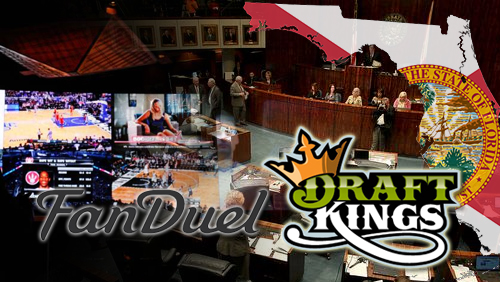 Daily fantasy sports sites FanDuel and DraftKings are setting their sights on getting the blessings of the Republican-led Florida Legislature.
Daily fantasy sports sites FanDuel and DraftKings are setting their sights on getting the blessings of the Republican-led Florida Legislature.
The two companies have set aside their rivalries to hire a prominent lobbying firm in Tallahassee as concerns over the legality of daily fantasy sports in the state arise, Bay News 9 reported.
According to the news outlet, Fantasy Sports Trade Association hired lobbyist Brian Ballard and his team “to establish a presence in Tallahassee and begin educating legislators about the dynamics of fantasy sports.”
FSTA Chairman Peter Schoenke told Legal Sports Report that they “continue to boost the FSTA’s resources in states with a large number of fantasy sports players to ensure that residents there can continue to fully play.”
There is no active or pending legislation regarding fantasy sports in Florida at the moment, but it remains to be an important state for DFS due to its large population base, not to mention the partnerships between many professional sports teams with either DraftKings or FanDuel. There is also Florida’s gray status in terms of fantasy sports law.
Lawyer Daniel Wallach wrote a lengthy article in June in which he explained that the legality of DFS in Florida does not depend on its status as a “skill game.” Fantasy sports’ legal status in the state hinges largely on an attorney general’s opinion in 1991, which provides that “a contest of skill where the contestant pays an entry fee, which does not make up the prize, for the opportunity to win a valuable prize by the exercise of skill, does not violate the gambling laws of this state.”
“As more money flows into fantasy sports and the character of the games begin to more closely resemble gambling (rather than an informal social game), the risk of a criminal prosecution heightens. As unlikely as that may seem to many, all it takes is one aggressive prosecutor or attorney general to jeopardize Florida’s lucrative and established fantasy sports market,” Wallach wrote.
More than 56 million Americans play fantasy sports in the U.S. and Canada, nearly double the number of participants in 2009, according to a recent study commissioned by FSTA. Those players spend an average of $465 annually on league-related costs, single-player challenge games, and league-related materials.
The DFS industry, which started in 2007, exploded two years ago when DraftKings and Major League Baseball entered a partnership that allows the site to offer co-branded MLB daily fantasy games. FanDuel, on the other hand, signed a deal with NBA in 2014.
This boom in DFS popularity has caught the eye of lawmakers, particularly New Jersey Sen. Frank Pallone, who just recently called for a probe on the link between fantasy sports and gambling.
Online sports gambling are outlawed under the 1992 Professional and Amateur Sports Protection Act (PASPA), but daily fantasy sports operate under a carve-out provided by the Unlawful Internet Gaming and Enforcement Act (UIGEA).
Pallone, incidentally, has been working tirelessly to end PASPA’s rule in his home state. The senator has been trying to pass sports betting legislations that will exempt New Jersey from PASPA in the last three years.
It seems New Jersey is fighting a never-ending battle to bring legal sports betting to the Garden State. Last month, a three-judge panel of the U.S. Third Circuit Court of Appeals rejected—in a 2-1 vote—the state’s appeal of a ruling that bars the implementation of its latest sports betting legislation.
But there’s still hope as the court has directed four major professional sports leagues and the NCAA to file a response in the sports betting case. The directive came after the state government asked for an “en banc” review by the full 23-judge circuit following last month’s decision, according to NewJersey.com.
Wallach told the news outlet that “en banc” requests are usually denied but “New Jersey’s rehearing chances were excellent because it had all of the right elements, such as a dissenting opinion, an intra-circuit split, and an exceptionally important issue.”
The state lost its 2013 case because its sports betting law called for governmental regulation and oversight of gambling, which is prohibited under PASPA. Judge Julio Fuentes, the lone dissenter in the August vote, said his colleagues failed to illustrate how the new law “results in sports wagering when there is no law in place… and no state involvement.”
There’s light at the end of a very far tunnel for sports betting in New Jersey, but not so much for daily fantasy sports, at least for now. In some ways, DFS mirrors the state of online poker in the United States. Like poker, fans have turned to fantasy sports looking to become rich while playing a game, leading to lucrative television contracts and also to unwanted government attention and a murky legal landscape.
Fantasy sports players, however, believe that DFS is “a legal alternative to sports betting.” In fact, 93.9 percent of the 1,420 DFS players interviewed by Ellers Research analysts said they wouldn’t stop playing fantasy sports even if real-money sports betting was “readily available and legal.” That number rose to 97.5 percent if legal real-money online poker was made legally accessible.